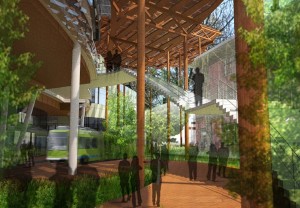 SANYO North America Corporation and InSpec Group announce a new 679-kilowatt solar system to be designed and installed by InSpec for the Oregon Sustainability Center in Portland, Oregon. The project also includes a 30-kilowatt hour large-scale lithium-ion battery storage system, which will be connected in line with the rooftop PV system, capable of supplying DC electricity for applications such as LED lighting. InSpec will be managing the solar and smart energy system design and installation for the building which is expected to be completed by the beginning of 2013, and will employ SANYO solar modules and batteries.
SANYO North America Corporation and InSpec Group announce a new 679-kilowatt solar system to be designed and installed by InSpec for the Oregon Sustainability Center in Portland, Oregon. The project also includes a 30-kilowatt hour large-scale lithium-ion battery storage system, which will be connected in line with the rooftop PV system, capable of supplying DC electricity for applications such as LED lighting. InSpec will be managing the solar and smart energy system design and installation for the building which is expected to be completed by the beginning of 2013, and will employ SANYO solar modules and batteries.
“The Oregon Sustainability Center is proactive in their use of green building materials, and the choice of SANYO HIT modules makes sense, as they are perfect for these types of powerful rooftop system installations, where space is limited,” said Charles Hanasaki, president of the Solar and Smart Energy Division. “We value our partnership with InSpec because they share our vision of helping customers to achieve a reduction in energy consumption from non-renewable sources and improving efficiency of energy used.” Yasuyoshi Kawanishi, president of SANYO Solar of Oregon, LLC, added, “Living in Oregon, our engineers are inspired by sustainability, and it makes us proud that our work is becoming a part of Oregon, especially in a landmark building like the Oregon Sustainability Center.”
The Oregon Sustainability Center is planned to be a future home to Oregon’s leaders in sustainable business, government, and education. The structure is designed to be the greenest high-rise ever built, with locally-sourced building materials, its own energy generation and ways to collect and treat water on-site, qualifying it for Living Building Challenge certification, which requires meeting net-zero energy and water performance as well as toxin free, locally-sourced materials. The Oregon Sustainability Center will be a showcase for green building, green business and community development. The building will demonstrate sustainable practices and will offer ways to connect the community to state and local sustainability resources, including green job training opportunities.


